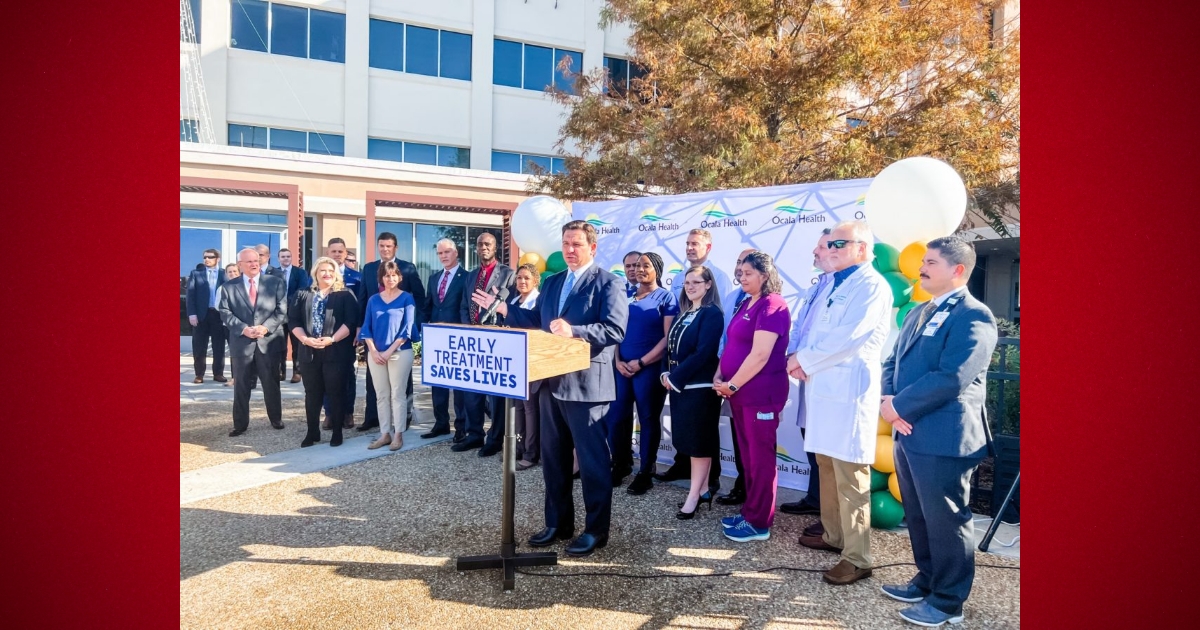Governor Ron DeSantis stopped by the Ocala Regional Medical Center this week.
During a trip to Ocala on Friday, the governor visited the local hospital and discussed early treatment options for COVID-19.

DeSantis began by stating that he is happy to have embraced early treatment options in the state of Florida. He stated that hard work went into making these treatments available, especially during the summer when the state was experiencing a high number of hospital admissions.
Even though some hospitals like ORMC were offering early treatment options such as monoclonal antibody treatment, DeSantis mentioned that a majority of the public was unaware that these options existed.
“The fact of the matter is a lot of these people that were admitted didn’t even know that this was something that was a possibility,” DeSantis said.
Throughout Florida, 25 different sites currently offer the monoclonal treatment which has proven to be effective, according to DeSantis.
Monoclonal antibodies are man-made proteins that can help the body fight off COVID-19 and reduce the risk of severe illness and hospitalization, but it needs to be administered soon after diagnosis.
DeSantis mentioned that the monoclonal treatment has a really good track record when someone gets infected, has symptoms, tests positive, and quickly gets the treatment.
“When you wait, and then you end up getting in the intensive care unit, at that point the monoclonal is not likely to be very effective,” he said.
According to DeSantis, people who receive the monoclonal treatment are far less likely to be admitted to the hospital.
DeSantis mentioned that other states make residents “jump through bureaucratic hoops” to receive the early treatment, and he wants to simplify the process for Florida residents to make the treatment more easily accessible.
He highlighted how Florida has one of the lower infection rates in the United States. As a result, monoclonal demands have been low, and there were fewer than a thousand people hospitalized with COVID-19 statewide during the month of November.
DeSantis anticipates that between now and May, the state will have over 25 million people including residents, snowbirds, and tourists. Monoclonal treatments will continue to be offered, and if demand goes up, then he will ensure that more treatment sites become available.
He discussed innovations and improvements that have come onto the market. On Wednesday, December 8, the Food and Drug Administration issued an emergency order authorizing a new product called Evusheld. This is AstraZeneca’s newest monoclonal antibody product for pre-exposure prevention of COVID-19 for people ages 12 and older.
Clinical trials showed that Evusheld reduced the risk of developing COVID-19 by 77%, according to DeSantis.
People who would qualify for Evusheld treatment include those who are immunocompromised and may not have an adequate immune response to vaccination. DeSantis reiterated that this treatment is not for post-exposure COVID-19 treatment.
There is currently a limited allocation of around 3,100 doses going to hospitals and clinics that are already administering monoclonal antibody treatment to patients.
DeSantis said, “The way we tried to allocate it was just to say, ‘Okay, can we get it within a two-hour drive of everyone in the state of Florida?’”
He reminded residents to visit the Florida Department of Health website for more information and to find testing and vaccination locations.
Heading into the new year, DeSantis expects the number of COVID-19 cases to increase. He stated that Florida is currently around three to four weeks behind last year’s schedule when compared to the rises and peaks of cases in 2020.
He feels that the preventative treatment tools will help combat those higher cases.
DeSantis ended by mentioning the Omicron variant, and he stated that South Africa has seen lower hospitalizations as a result of this variant when compared to the previous Delta variant.
While current data is showing that Omicron is not leading to a significant increase in hospital admissions compared to Delta, he told the crowd that the new variant will continue to be closely monitored by the Department of Health.

